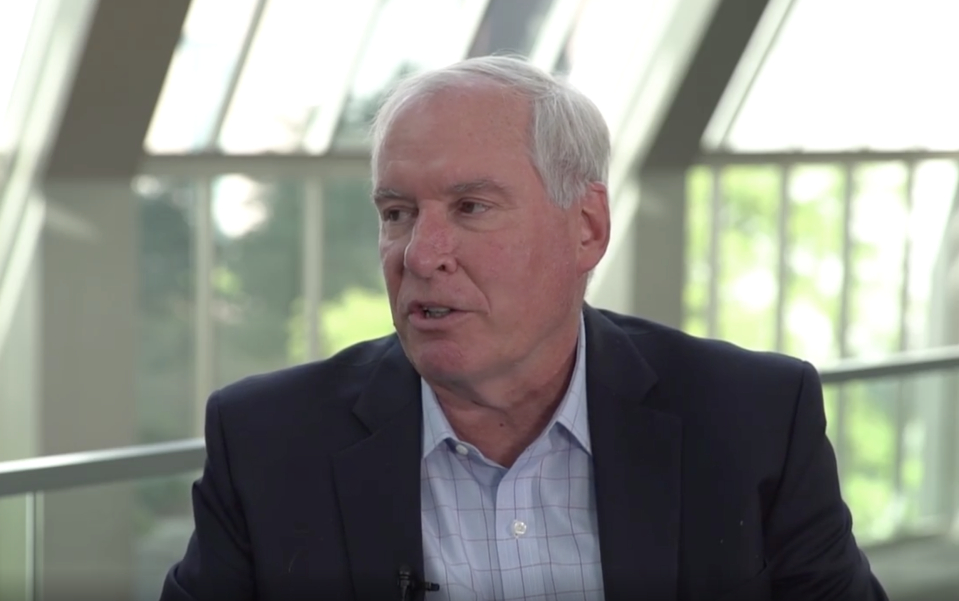Boston Fed's Rosengren: US economy 'consistent with staying where we are'
Boston Fed President Eric Rosengren says the central bank is “pretty close” to fulfilling its dual mandate on inflation and unemployment, suggesting that he may not see a case for a rate cut at the moment.
Addressing the September jobs report, Rosengren said job gains of 136,000 (compared to expectations of 145,000) were “weaker than we were hoping” but said a tight labor market will at some point have to slow down.
“We’re pretty close to where we want to be,” Rosengren told Yahoo Finance in an interview over the weekend. “That is an environment where I would expect the payroll employment to actually gradually be a little bit slower, but consistent with staying where we are.”
Rosengren said his baseline forecast is for GDP growth of 1.7% in the second half of this year. Although real GDP increased 3.1% in the first quarter, second quarter GDP growth tempered to 2%.
Rosengren said the slowing is not necessarily a bad thing, and reflects “roughly what we think potential is.” Pointing to a strong U.S consumer, he said positive readings on personal income, stock market levels, housing prices, and unemployment claims show a healthy economy.

Although Rosengren said he does not want to prejudge the Federal Open Market Committee’s next policy-setting meeting taking place Oct. 29 and 30, he said incoming data on the U.S. consumer “should be strong,” in which case “there’s not nearly as much of a need to do something.”
“One of the reasons to kind of sit back and wait and watch is to see whether we have sufficient amount of accommodation now or not,” Rosengren said.
Reflecting on his dissents
Rosengren dissented from both Fed decisions this year to cut rates, saying that the data did not show a U.S. economy in need of accommodation. The federal funds rate target is now in a range of 1.75% to 2%.
He added that if anything, lower rates would encourage more corporate lending and recently flagged WeWork-like shared office space models as another risk.
“The challenge is that these kind of models rely on long-term leases but then provide space to people on a shorter-term basis,” Rosengren said. “That’s the kind of financial stability issue that we’ve had at other times, where we’ve had a mismatch of assets and liabilities.”
His colleagues who have supported rate cuts, on the other hand, have pushed for the Fed to pre-emptively cut rates to soften the blow of an escalating trade war. Manufacturing figures have shown some effects of tariffs on the economy, as the ISM manufacturing index fell to its lowest level since mid-2009.
Rosengren said three dissents (a record under Fed Chairman Jay Powell) point to healthy debate within the central bank.
“Sometimes we have contentious meetings, sometimes they’re not so contentious,” Rosengren said. “Turning points in the economy are times when people are going to disagree.”
On data-dependence, Rosengren suggested that policymakers appear to agree that the data “haven’t been all that bad,” but said the underlying debate over future policy lies in how substantial the risks are.
In the Boston Fed district, which covers New England, Rosengren says trade risks have not affected his contacts all that much. Although the yield curve has flashed concerns in financial markets, Rosengren said businesses in his district are more concerned about the tight labor market making it difficult to find workers.
“We may not be as affected as other parts of the country,” Rosengren said of trade concerns. “So that may account for some of the difference. But my overall expectation is the economy grows strong enough, we don’t have a recession, and that labor markets remain tight.”
Brian Cheung is a reporter covering the banking industry and the intersection of finance and policy for Yahoo Finance. You can follow him on Twitter @bcheungz.
New Wells Fargo CEO will again run a West Coast-based company from NYC
Boston Fed’s Rosengren: Lower rates could expose co-working companies like WeWork
St. Louis Fed's Bullard: 'Prudent risk management' would have been a 50 basis point cut
‘The weirdest place in the world’: What the Fed missed in Jackson Hole
Read the latest financial and business news from Yahoo Finance
Follow Yahoo Finance on Twitter, Facebook, Instagram, Flipboard, SmartNews, LinkedIn, YouTube, and reddit.


